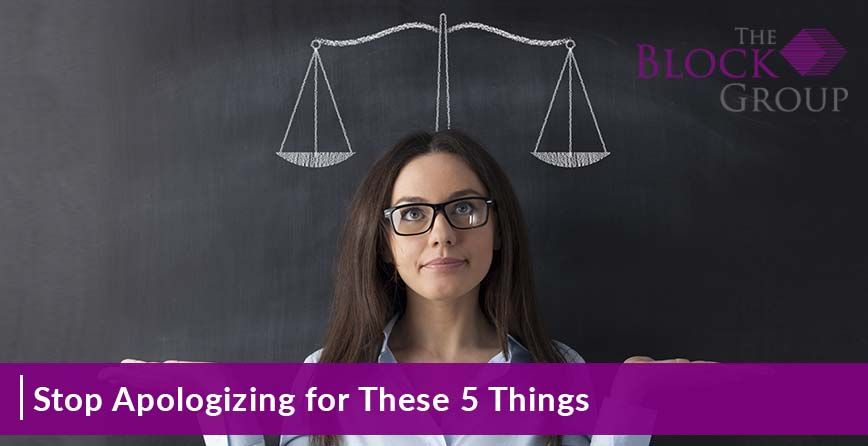
Stop Apologizing for These 5 Things
There are very few people that don't struggle with work-life balance, at least to some extent. We all want to get better at it, but we don't want to make tradeoffs in productivity. And there's a vastly unhelpful by-product that oozes out of this tension.
Guilt.
As if it isn't hard enough to balance our efforts to find balance, we also have to deal with this agonizing emotion. Or do we?
I say we don't. With three decades of experience managing others trying to manage work-life balance (and in trying to manage my own), I can tell you that a set of very specific guilt-causing conditions keeps surfacing.
So be on the lookout for when you start feeling guilty about any of these five things and don't feel guilty about banishing them on the spot.

1. Having a life outside work.
It's easy to get caught up in the comparison game, feeling like if you're not in the office getting as much face time as your peers, if you're not available to answer emails late at night like co-workers do, or if you have to leave early to pick up your kids, that you're not dedicated enough.
I worked with plenty of these corporate warriors that prided themselves on being work robots. But they inspired no one. The most inspiring leaders were the ones that role-modeled a line in the sand--they'd give the job only so much, then the rest of the day or evening was for them, their families, and their outside life. So proudly show that you have a life. You'll make yours better and influence others to do the same.

2. Having boundaries.
This is more specific than feeling guilty about having a life. This is where you set parameters within your allotted work time for what you will and will not do, and end up feeling bad in situations when you won't do something.
For example, for the longest time I felt bad about telling people that asked me to mentor them that I can't take on any more mentees, but that I can offer my services as a paid coach. No longer. I learned to set boundaries that there are some things I can't afford to give away anymore. Such boundaries are critical for self-preservation and are usually respected by others, as long as those boundaries have been clearly communicated.

3. Brutally prioritizing.
This isn't about establishing boundaries, it's about establishing a pecking order. You simply cannot achieve work-life balance, or work-life integration, or whatever term you prefer, without getting really good at prioritizing. Which means some things will be a priority, and some won't. Which means you won't get to some things. Or some people.
And that's OK.
It's OK to apologize to the person who isn't prioritized, but it's not OK to beat yourself up about it. Whenever I know I won't get to someone or something, I tell myself, "If I do everything, I won't accomplish anything." It's true. Stretching yourself too thin to avoid feeling guilty about something you can't get to will exhaust you and lead to nothing being done well.
And prioritizing means saying "no", probably more than you want to. Heck, Warren Buffett says saying no is the key to success.

4. Having peaks and valleys.
If you're struggling to maintain work-life balance, then almost by default you're going to have peaks and valleys--times when you're at your best and others when, well, not so much.
The key is to anticipate when you might not be at your best and then do your best to do your best. There's nothing else you can do. No human being can be always on and you shouldn't feel guilty for those times when your energy, output, or outcome isn't what you would have wanted.

5. Asking for help at work.
Asking for help is not a sign of weakness, it's a sign of wisdom. To stave off any guilt you might feel in asking for help at work, make the ask specific and be helpable. By this I mean do due diligence in advance before asking for help to show you've done what you can on your own and to show why you need help, in what way. And if you come from a foundation of always trying to be helpful to others, it's much less likely you'll feel guilt when it's your turn to get help.
Achieving any semblance of work-life balance is hard enough. Make it easier on yourself by ditching the apologies and self-induced agony.
Source: Inc.




